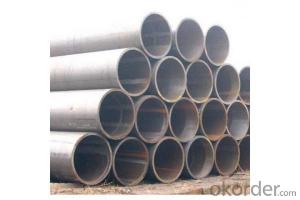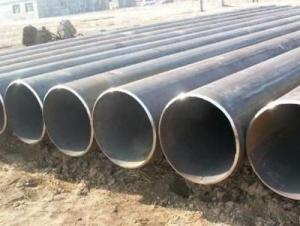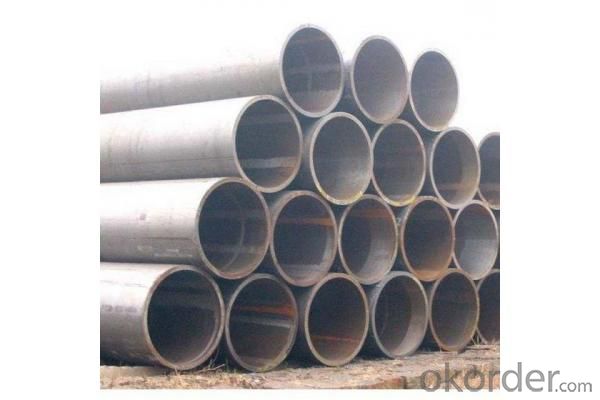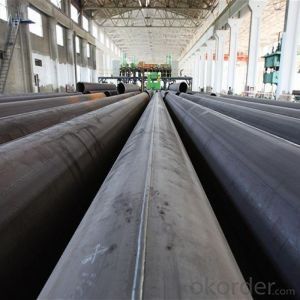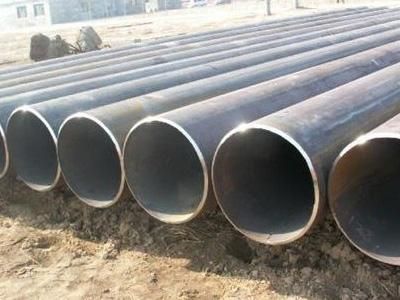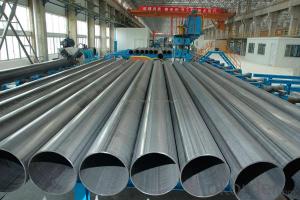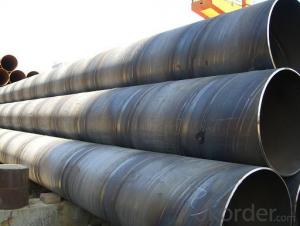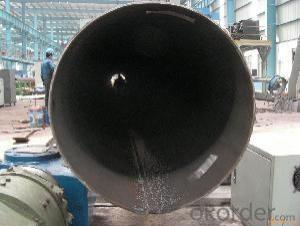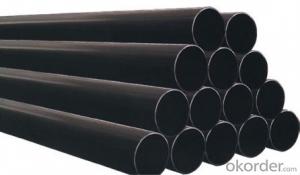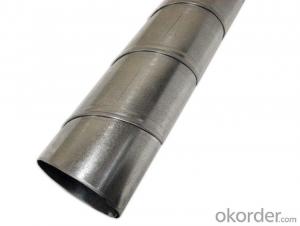CARBON STEEL LSAW PIPE 6''-48''
- Loading Port:
- China Main Port
- Payment Terms:
- TT OR LC
- Min Order Qty:
- -
- Supply Capability:
- -
OKorder Service Pledge
OKorder Financial Service
You Might Also Like
Packaging & Delivery
Packaging Detail: | Normal exporting packing,in container or bulk vessel or as per clients' request |
Delivery Detail: | 2 months after confimed contract |
Specifications
Large Diameter API 5L X70 PSL2 LSAW Steel Pipe
Grade: X42, X46, X50, X52, X60, B, C
OD: 1.5"-28"
WT: SCH10-SCH160
Brand:TPCO
Large Diameter API 5L X70 PSL2 LSAW Steel Pipe
Specifications:
u Standard: API 5L
u Grade: B, C, X42, X46, X50, X52, X56, X60, X65, X70, X80
u OD: 1.5"-28"
u WT: SCH10-SCH160
u Length: 5-12m
u Ends Finish: plain end, bevel end, grooved end
u Surface Treatment: bare, black varnished, oiled finish, red color, anti-corrosion, 3PE, FBE or epoxy coating
u Technique: hot rolled or cold drawn
u Application: api 5l steel pipe for conveying oil, water, gas
u Invoicing: based on theoretical weight or actual weight
u Payment Terms: L/C at sight, T/T or Western Union
u Trade Terms: FOB, CFR, CIF
u Certification: ABS manufacturing assessment, ABS design assessment, API 5CT, API 5L, DNV manufacturer certificate, ISO9001 quality management system certificate, ISO14001 environment management system certificate, GB/T28001 occupational health and safety management system certificate, A1 class manufacturing license of special equipment certificate, CCS, GL, LR, SGS, TüV, PDE
- Q: Can steel pipes be used in earthquake-prone areas?
- Indeed, in areas prone to earthquakes, steel pipes have the potential to be employed. Steel, as a durable and sturdy material, possesses the capacity to endure the forces generated during an earthquake. The malleability and pliability of steel facilitate the absorption and dissipation of seismic wave energy, thereby decreasing the likelihood of structural failure. Furthermore, the ability to weld steel pipes enables the construction of resilient and earthquake-resistant edifices. Nevertheless, it is crucial to adhere to appropriate engineering and construction practices to guarantee the proper installation and connection of steel pipes, thereby maximizing their capacity to withstand earthquakes. Additionally, it is imperative to consider local building codes and regulations to ensure compliance and safety in earthquake-prone regions.
- Q: How are steel pipes used in the construction of buildings?
- Steel pipes are commonly used in the construction of buildings for various purposes. They are primarily used for structural support, providing stability and strength to the overall framework. Steel pipes are also used for plumbing systems, carrying water and other fluids throughout the building. Additionally, they are used for HVAC (heating, ventilation, and air conditioning) systems, allowing for efficient distribution of air. Overall, steel pipes play a crucial role in ensuring the durability, functionality, and safety of buildings.
- Q: How are steel pipes used in the manufacturing of sewage treatment plants?
- Steel pipes are used in the manufacturing of sewage treatment plants for various purposes, including the transportation of wastewater, the distribution of chemicals and additives, and the construction of various components such as tanks, pumps, and pipelines. Steel pipes are preferred due to their strength, durability, and resistance to corrosion, ensuring reliable and long-lasting infrastructure for the efficient operation of sewage treatment plants.
- Q: What are the different types of steel pipe tees?
- There are three main types of steel pipe tees: equal tee, reducing tee, and barred tee.
- Q: What is the bending strength of steel pipes?
- The bending strength of steel pipes can vary depending on factors such as the grade and thickness of the steel, as well as the specific manufacturing process. However, in general, steel pipes are known for their high bending strength due to the inherent strength and durability of the material.
- Q: What are the different methods of pipe welding for steel pipes?
- There are several methods of pipe welding for steel pipes, including Shielded Metal Arc Welding (SMAW), Gas Metal Arc Welding (GMAW), Flux-Cored Arc Welding (FCAW), Submerged Arc Welding (SAW), and Tungsten Inert Gas Welding (TIG). Each method has its own advantages and is used depending on the specific requirements of the project, such as the thickness of the pipe, the type of steel, and the desired weld quality.
- Q: How are steel pipes protected during transportation?
- Steel pipes are protected during transportation through a variety of measures to ensure their safety and integrity. One common method is the use of protective coatings on the exterior of the pipes. These coatings, such as epoxy or polyethylene, serve as a barrier against external factors like moisture, corrosion, and physical damage. Additionally, the pipes are often bundled together and secured with strapping or bands to prevent movement and potential collisions during transit. In some cases, pipes may also be placed within wooden crates or containers for added protection against impact and handling. Furthermore, careful loading and unloading procedures are followed to minimize any stress or strain on the pipes. By implementing these protective measures, steel pipes can safely reach their destination without compromising their quality or structural integrity.
- Q: Can steel pipes be used for underground drainage systems?
- Yes, steel pipes can be used for underground drainage systems. Steel pipes are durable, strong, and resistant to corrosion, making them a suitable choice for underground applications. They can effectively handle the flow of water and withstand the pressure of soil and external elements. However, it is important to ensure proper insulation and anti-corrosion measures are in place to protect the steel pipes from potential damage caused by moisture and chemical reactions.
- Q: Can steel pipes be used for underground power transmission?
- Indeed, underground power transmission can make use of steel pipes. Due to their resilience, robustness, and resistance to corrosion, steel pipes are extensively employed in underground power transmission systems. These pipes serve as a safeguarding enclosure for power cables, guaranteeing their security and shielding them from potential harm caused by external elements like moisture, soil movements, and potential impacts. Moreover, the use of steel pipes facilitates easy installation, maintenance, and repair of the power transmission system. Additionally, their ability to withstand high pressure and temperature renders them suitable for conveying the high voltage electricity essential for power transmission. All in all, steel pipes are a dependable and effective choice for underground power transmission.
- Q: Are steel pipes resistant to UV degradation?
- In general, steel pipes lack resistance to UV degradation. When exposed to ultraviolet (UV) radiation for extended periods, steel pipes may experience different types of degradation. The steel can become prone to brittleness, resulting in cracks and potential failure. Moreover, UV radiation can induce corrosion and discoloration on the surface of the steel pipes. To counteract the effects of UV degradation, it is possible to apply protective coatings or paint to create a barrier against UV radiation. Regular maintenance and inspections are crucial to detect any indications of UV degradation and implement necessary actions to prevent further deterioration.
Send your message to us
CARBON STEEL LSAW PIPE 6''-48''
- Loading Port:
- China Main Port
- Payment Terms:
- TT OR LC
- Min Order Qty:
- -
- Supply Capability:
- -
OKorder Service Pledge
OKorder Financial Service
Similar products
Hot products
Hot Searches
Related keywords
